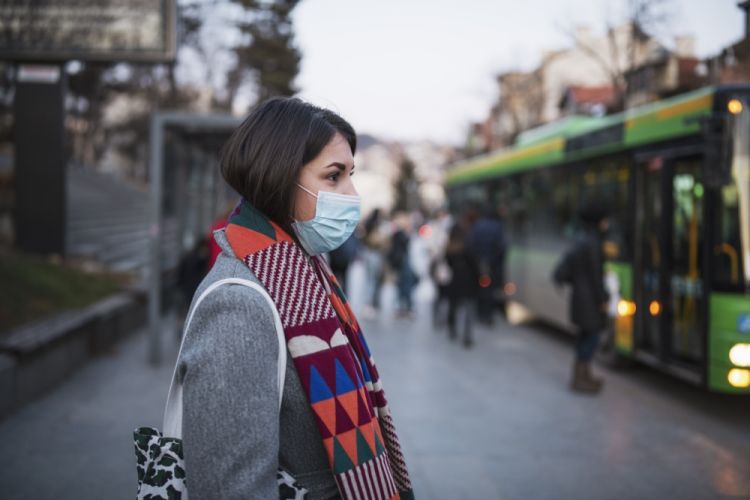Sex and Covid-19

The gendered impacts of Covid-19 intersect with other characteristics such as age, ethnicity, disability, class and migration status. This results in different effects for different groups of women. Single mothers are particularly affected as their economic position is often more disadvantaged and, in some cases, financially precarious as they rely on one source of income. Migrant women who have lost their jobs and are subject to the no recourse to public funds condition will be unable to access the benefits system. This leaves these women and their families without the means to cover their housing costs or to feed their families. It puts them at risk of being in poverty.
Issues facing workers in Wales based on sex
- Statistics from Public Health Wales show that women are more likely, across the majority of age groups, to contract coronavirus than men. Wales has a higher percentage of women working on the front line and women are also more likely to have caring responsibilities which means they carry out more duties that risk putting them at risk.
- In Wales, more men than women have died of coronavirus. In China, lifestyle factors such as poor diet and smoking have been linked to death from coronavirus. However, we need further data and research to explain why, despite more women contracting the virus in Wales, more men have died from it.
- The pay gap between men and women remains stubbornly high, even in front line key worker jobs. But the pay gap is higher still for women in the caring, cleaning and catering sectors. Too often, the work that women do is chronically undervalued and underpaid. The types of contracts are often less secure, fixed term, zero hours or term time only. Progression within a workplace on these kinds of contracts is slow or non-existent.
- PPE is a huge issue. The availability of it, the quality of it, and the fit or sizing. Women dominate our lowest paid jobs, and the jobs most likely to be working on the front line of this crisis where PPE is essential.
- Full PPE is hot and heavy. It causes workers to sweat, feel uncomfortable and not recognise each other. It’s cumbersome to doff (take off) and don (put on) and many workers have reported that despite being thirsty and uncomfortable, they drink less so that they don’t have to go to the toilet. For women going through the menopause this can make work unbearable. It can also cause exhaustion, urinary tract infections and stress.
- The financial impact of the Covid-19 crisis is yet to be fully realised. However, women already dominate low paid, part time, and fixed term contracts. Since 2011, out of all workers, it is Black women who have seen the sharpest rise in being employed on zero-hour contracts.
- The garment industry has been devastated. Workers in this industry are the poorest paid, Black and Minority Ethnic (BME) women workers in the world. Orders have fallen dramatically, and big chains have reneged on contracts for garments. This put’s the world’s poorest women and their children at further risk of absolute poverty. Trade Unions are calling for our Government’s to act to protect the workers in our global community as well as our local community.
- Period Dignity is crucial at this time. Girls and women may not be able to afford or access products. Or they may not be able to go shopping for them.
- Mothers are more likely to be key workers than fathers or non-parents. According to research by the Resolution Foundation 39% of working mothers were key workers before this crisis began, compared to 27% of the working population as a whole.
- Care workers (predominantly women) are now working beyond their job descriptions as elderly patients are often not being admitted to hospital. This forces them to do more of a nursing role which they aren’t trained or paid to do and where the risk of catching the virus is higher. Trade Unions are calling for care workers be recognised for the extra work they are doing.
- There were 50,946 deaths involving Covid-19 registered in England and Wales up to 10 July 2020 (28,040 men and 22,906 women) (ONS)
- The jobs least likely to be able to be carried out from home (such as elementary construction occupations) are mostly done by men. When looking at the fifth of workers in jobs least likely to be able to work from home, 75% are men (ONS)
Many unions have removed restrictions around membership joining and are providing legal support from the day of joining. Join a union today.
Employees whose work is critical to the coronavirus response are classed as critical workers in Wales. This includes health and social care workers, teachers, people working in supermarkets and many more occupations. There are approximately 490,000 critical workers in Wales, which is around one-third of the workforce. Women are more likely to be critical workers than men. 40% of all women in employment in Wales are critical workers, compared to 28% of men.
In Wales, women and those from a minority ethnic background are the groups of workers, most likely to be employed within occupations that have the highest risk.
Within some ethnic groups there are an even higher proportion of women. Around two thirds (66%) of critical workers of an Asian background other than Indian, Pakistani, Bangladeshi and Chinese were women.
The Welsh Government published guidance in March 2020 on the types of businesses that should remain closed during the initial stages of the coronavirus pandemic. Business such as pubs, restaurants and leisure centres were included.
Around 230,000 people were employed in industries in Wales in 2019 that were told to close after the initial coronavirus pandemic, representing around 16% of the total workforce. Women, young people and employees from a minority ethnic background are more likely to be employed in those industries.
There were more women (55%) than men (44%) working in industries told to close. That equates to 18% of all female employees in Wales compared to 14% of all male employees.
Younger women workers (those under 25) make up 12% of all women employees in Wales, but 28% of all those in industries told to close.
In Wales, self-employed people are more likely to be male.

Your rights as a worker in relation to your sex
Section 44 of the Employment Rights Act 1996 provides workers with the right to withdraw from and refuse to return to a workplace that is unsafe.
There have been several examples of union branches walking off the job citing this law.
If you feel your workplace is unsafe due to Covid-19, you should contact your union's legal team for urgent advice.
Read more about your rights if you refuse to work because of coronavirus safety concerns.
The Equality Act 2010 is the key piece of legislation dealing with workplace discrimination. It protects workers from discrimination based on age, sex, disability, race, religion or belief, sexual orientation, marriage or civil partnership status, pregnancy or maternity, or gender reassignment.
Union representatives have a key role to play in:
• promoting equal rights for all members. Reps can negotiate with employers for policies and procedures that advance equality and do not lead to one group being disproportionately disadvantaged
• creating a supportive atmosphere at work and in the union in which all members feel that they can participate and that their opinions are valued
• challenging instances of harassment and discrimination and ensuring complaints are dealt with effectively
• acting as a role model in treating everyone fairly.
For more information on how the Equality Act can protect workers visit our Covid-19 and reasonable adjustments guide for reps.
What your employer should do
- Your employer should still be adhering to the law on reasonable adjustments. There is a mistaken belief that ‘normal business’ has been suspended as far as the Equality Act goes. Union members with protected characteristics report having more difficulties getting reasonable adjustments agreed or keeping hold of them, in part because workplaces are often under staffed due to illness.
- People at increased risk, in discussion with their line manager, may require an adjustment to allow them to change their working arrangements or to work from home. Line managers should actively work with workers to ensure they have the right support and are safe at work, especially during this Covid-19 crisis.
- Employers should be undertaking risk assessments in consultations with unions for home working as they should any other workplace. Employers should consider accidents, injuries, workers mental health and stress levels and the risk of violence, alongside other factors which allow workers to work comfortably and safely. Adjustments to keep workers comfortable at work, such as equipment to support good posture, or to manage temperature, should be provided by employers. Read more about how to stay safe when working from home and how health and safety reps can help homeworkers.
- Employers should listen to women within their workplace. Allowing women a safe space to organise, network and discuss can be the first step, but employers need to make sure that women are actively listened to when they raise issues relating to disability and the workplace.
- While there are health and safety risks related to homeworking to consider especially with equipment, and employers need to take reasonable adjustment requirements seriously; there are also benefits to home working for many people and we hope in future bosses will be more open to offering flexibility. This flexibility can be particularly advantageous to disabled people who need to manage their work in a different way and to people with caring responsibilities as well as to companies who are looking to benefit from being able to recruit from a larger group of people and to the environment as workers reduce the time they spend commuting.
- Your employer has a legal obligation to protect your health and safety at work. Prior to you working, your employer should do a risk assessment that highlights the particular risks of Covid-19. This assessment should include questions on who you live with, whether you or members of your household are vulnerable, and how you intend to get to work if you are unable to work from home. The risk assessment should also include what adjustments you need to be able to do your job.
- If your employer has done everything they can to eliminate all other risks, and you still are required to work, then your employer has a duty to provide you with the appropriate personal protective equipment (PPE) to allow you to do your job. This isn’t only the case in medical workplaces, but in all workplaces, including care homes, shops, warehouses and transport vehicles. Read more information on PPE and the workplace.
- If you are working from home, your employer still has to protect you. This means ensuring that you have a safe environment to work in, and that you have access to the correct equipment to allow you to do your job. Your employer should support you to continue doing your job, even if working from home means you do it in a different way.
- If you have childcare or other caring responsibilities, if you need adjustments because of your disability or long term health condition or if you have any other needs, you should discuss this with your employer. They should consider your needs and make reasonable adjustments.
- If you are pregnant and working, your employer has a legal obligation to assess the workplace risks for you and your unborn children. This also applies to breastfeeding mothers who have returned to work. Read more about your rights as a pregnant worker.
- This pandemic is a testing and difficult time for many of us. Mental health and your wellbeing is extremely important and your employer should support you during this crisis. Follow our bitesize Coping with Covid learning sessions which will give you the tools and techniques to help you look after yourself during this time.
- If you are facing a change in your housing situation, your employer can help you and provide adjustments during this time.

What we're asking Government to do to protect workers in relation to sex
- We're concerned that some employers are flouting the law. We're working with the Welsh Government to protect workers and their income, jobs and health and access to services.
- The gender, race and disability gap exist and will be deepened by this crisis. We are working with Government to investigate how to examine this in greater detail and then how to mitigate it as much as possible.
- This action must be part of a broader strategy to protect the health and safety of people at work. It must include stronger government guidance (underpinned by regulation) on the safety measures all employers must consider now. It must also include new powers (via a tripartite network, involving employers, unions and the HSE) for government to compel employers who do not follow these steps to close.
Read about how to negotiate with employers and to protect the workforce in our coronavirus reps guide.
Tell us your experience
Are you worried about not being able to stay safe from coronavirus at your workplace? Please tell us your experiences using our whistle blowing form.
We will anonymously share the information about your health and safety concern with Welsh Government and the Health & Safety Executive (HSE). If you tell us it’s OK to pass on your details, we will also report the issue to your trade union for you.
Fill in our health and safety whistleblowing form
Join a union
Unions help workers get together, stop people being treated unfairly and get a better deal from their employers.
They’re there when times are tough – providing free legal advice if you need it. There are lots of discounts and offers for union members too. And every year they help more than 200,000 people get the training and learning opportunities they need to move on in their career.
Isn’t it time you joined a union?
